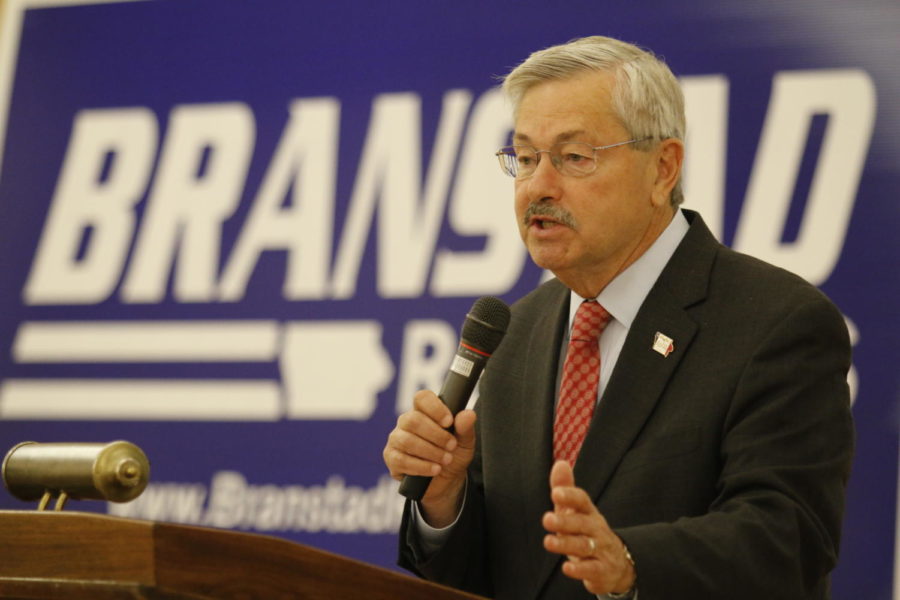Iowa Legislature to review Gov. Branstad’s university funding proposal
Richard Martinez/Iowa State Dail
Iowa Gov. Terry Branstad during an event Sept. 9, 2014 in the Gallery Room of the Memorial Union at Iowa State University.
January 29, 2016
University stakeholders are awaiting talks on a funding proposal put forth by Gov. Terry Branstad. In his budget proposal, released earlier this year, Branstad approved an increase of almost $8 million for the three regent universities, short of the $20 million requested by the Board of Regents.
In September 2015, the Board of Regents asked for an increase of $20.3 million in funding for the three state universities along with recurring appropriations of more than $507.4 million for the next financial year. The regents’ request cites growing enrollment at Iowa State and needing to address needs associated with this growth.
“I think it’s pretty early on to know,” said Warren Madden, senior vice president for business and finance. “This is just the beginning of a process that will go on over the next two or three months. Although we need to effectively communicate our needs, it’s not a time to get too worked up that things may not move along.”
Madden said the legislature will begin committee meetings on university funding in the next few weeks. ISU President Steven Leath usually makes the case for a budget increase at the state capitol during these meetings.
Sen. Herman Quirmbach, D-Ames, vice chairman of the Education Appropriations Subcommittee, said the governor “has not been very responsive” to the demands put forth by the Board of Regents, adding that this could affect student experience at the regent universities. He added he will meet with university representatives to discuss this issue.
“The Board of Regents is committed to continuing to work with the legislature and the governor on higher education funding,” said Josh Lehman, senior communications director for the Board of Regents. “It’s a long time from now to the end of the legislative session. It is far too early to make any determination because no decision has been made about the appropriated money.”
As per the regents’ request, additional funding would be used for hiring more faculty members, academic advisers and lab coordinators. Other areas for funding include investment in “big-data” initiatives such as Map-Works to improve student retention, support for “personalized learning” through programs like learning communities and upgrading campus infrastructure.
“Our faculty-student ratio has gone up,” Madden said. “You want to maintain quality, but you want to hold down cost. So striking the balance is complicated and challenging.”
Quirmbach said he has also observed the impact of increased enrollment in his own class that he taught in the fall.
Madden said higher education funding is also dependent on the overall fiscal condition of the state. He said not having cuts to the higher education budget is a positive, yet the decline in projected state revenue could be a cause for concern.
“At this time, we are looking into all aspects of the budget as it is a tight budget year,” Rep. Tom Moore, R-Griswold, vice chairman of Education Appropriations Subcommittee of the House, wrote in an email. “This is one that will be discussed at length as to funding and distribution.”
In addition to the $8.1 million requested, the regents also have a non-appropriations request for salary increases to maintain competitive faculty salaries.
There are other groups that play a role in the funding process, Madden said. Alumni groups such as Alliance for Iowa State advocate for higher university funding by asking legislators throughout the state for support. Quirmbach said students coming from throughout the state could also make their voices heard by contacting their hometown legislators.
“If we are going to follow our mission as a land-grant institution, we need to provide appropriate resources,” Quirmbach said. “Otherwise, students will have to bear the burden.”

















